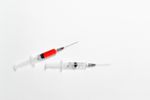Here’s what you need to know about the most recent evolution of SARS-CoV-2.
As we near the one-year mark of the coronavirus pandemic, the race for a vaccine has resulted in some very promising news: Pharmaceutical companies Pfizer and Moderna announced that their vaccines proved to be more than 90 percent effective and 94.5 percent effective, respectively, and distribution is off to a decent start. Both vaccines use a technology called mRNA, or messenger RNA, to train the immune system to target spike proteins on the surface of the virus.
However, as you might know from getting the yearly flu shot, it’s the nature of viruses to mutate. In fact, by September 2020, researchers had already tracked more than 12,000 mutations in the novel coronavirus, and while some mutations hinder the virus, others could theoretically help it evade vaccines and treatments.
So what does that mean for the COVID-19 vaccines that have just recently been approved? Here, experts weigh in.
RELATED: How Coronavirus Really Spreads Indoors
Viral Mutations 101
The coronavirus is an RNA virus. This usually means the virus can change or mutate more quickly than a DNA virus because RNA is less stable and more susceptible to mutation. But according to Nature, SARS-CoV-2 is changing much more slowly than many RNA viruses (like HIV, which mutates rapidly). Despite this slow-moving mutation rate, thousands of SARS-CoV-2 mutations have already occurred.
Getting back to the the basics, a virus is a microscopic parasite (usually smaller than bacteria) that cannot reproduce outside of a host body, meaning it must use the cells of the host to replicate. During the replication process, it’s common for the virus to make errors. These errors often have very little effect on the virus.
However, sometimes replication errors can make the virus more easily transmitted or even more severe, while other errors may harm the virus’s efficacy (such as mutations that alter the shape of proteins).
The Novel Coronavirus Mutations
Until recently, one genetic mutation of SARS-CoV-2 stood out: the D614G mutation.
As soon as the pandemic began, Bette Korber, an expert in HIV evolution and computational biologist at the Los Alamos National Laboratory (LANL) in New Mexico, began studying the genetic sequences of SARS-CoV-2. In March, one particular mutation caught her eye. One amino acid changed from a D (aspartate) to a G (glycine) at position 614, hence the name D614G.
This mutation occurred in the gene that encodes the spike protein, which is responsible for cell entry. In other words, it helps the virus penetrate cells more easily. By April, Korber saw this mutation quickly become the dominant strain of SARS-CoV-2 throughout Europe, the United States, Canada and Australia.
Although the D614G mutation sounds scary, it doesn’t necessarily translate to being more dangerous. In fact, according to Nature, “it’s even possible that the D614G change could make the virus an easier target for vaccines.” Take the Pfizer vaccine for example — mice, monkeys and humans that received the Pfizer vaccine produced antibodies that blocked the G strain of the virus better than the D strain.
RELATED: How to Optimize Your Health to Fight COVID-19 — And Beyond
What About the New U.K. Variant?
Recent news about a more infectious strain of coronavirus in the United Kingdom — known as B.1.1.7 — has been making headlines and raising fears. The B.1.1.7 strain was first detected in the U.K. in September, but is responsible for 60 percent of new infections in London. However, while research on this strain is still being done, many scientists currently believe it will have no effect on the Pfizer or Moderna vaccines.
Although viruses mutate constantly, they don’t often mutate so dramatically as to render a vaccine useless, explained William Schaffner, MD, an advisor to the US Centers for Disease Control and Prevention on vaccines, to CNN."Even with mutations, the virus essentially stays the same. It's like with a person. I can switch out my brown coat for a gray coat, but… I'm still the same person."
The main concern with this new strain comes from its transmission rates. According to Neil Ferguson, an epidemiologist at Imperial College London, the variant has an increased transmission rate of 50 to 70 percent compared with other variants currently in the U.K., making it a more contagious strain.
The encouraging news is that the B.1.1.7 strain, like the D614G mutation, “does not alter the effectiveness of social distancing, face masks, hand washing, hand sanitizers and ventilation,” Muge Cevik, MD, an infectious disease specialist at the University of St. Andrews School of Medicine, said on Twitter. So, keep sticking to those public health recommendations!
What Does All of This Mean for COVID-19 Vaccines?
As antiviral treatments and vaccines go into effect, selective pressure on the virus may encourage mutations in order to bypass the treatment or vaccine that’s inhibiting its ability to infect. For example, the antiviral drug remdesivir, which targets the polymerase protein in charge of replicating the viral genome. If a mutation changes the function of this specific protein, remdesivir could be rendered ineffective, meaning the virus might continue to spread and there would be one less therapeutic to combat it.
However, while theoretically plausible, this scenario is unlikely. For instance, in the case of the seasonal flu, which requires annual inoculation to address mutations, resistance to the main antiviral treatment oseltamivir (a.k.a. Tamiflu) is very rare, explains Olivia Kates, MD.
Even a mutation in the SARS-CoV-2 viral spike protein would most likely have little effect on how potential vaccines function. “Poliovirus, measles, mumps, hepatitis A, rotavirus and even rabies are all RNA viruses that we have used vaccines against for decades without significant changes,” says Kates.
Even better news: There are currently 319 different treatments and 236 different coronavirus vaccines in development, according to the Milken Institute’s COVID-19 treatment and vaccine tracker. Plus, research will continue to evolve, so if mutations do arise that could affect any one of these treatments or vaccines, there is a wide net to fall back on. And, according to a study done in August from a team at Walter Reed, research shows vaccines continue to work against several coronavirus mutations.
Research shows vaccines continue to work against several coronavirus mutations.
Ultimately, the coronavirus has already mutated thousands of times without significant differences from the virus that originated in Wuhan, China. The COVID-19 vaccines will most likely protect people against the vast majority of circulating COVID-19 strains for the foreseeable mutations, Mark Schleiss, MD, a pediatric infectious disease specialist told Healthline. As mutations continue to occur, Schleiss believes there could be breakthrough infections, but he doubts that mutations would make the virus more deadly.
In the meantime, the best thing we all can do is focus on stopping the spread of COVID-19. That's why proven measures such as using face masks, distancing from others and washing your hands are still incredibly important, Kates reminds us. (Here's a refresher on why everyone should wear a face mask.)
Ultimately, in addition to those safety measures, "using vaccines to dramatically reduce the number of people who are exposed or infected may be enough to halt the spread of the virus, even if the vaccine is not perfect," she notes.




